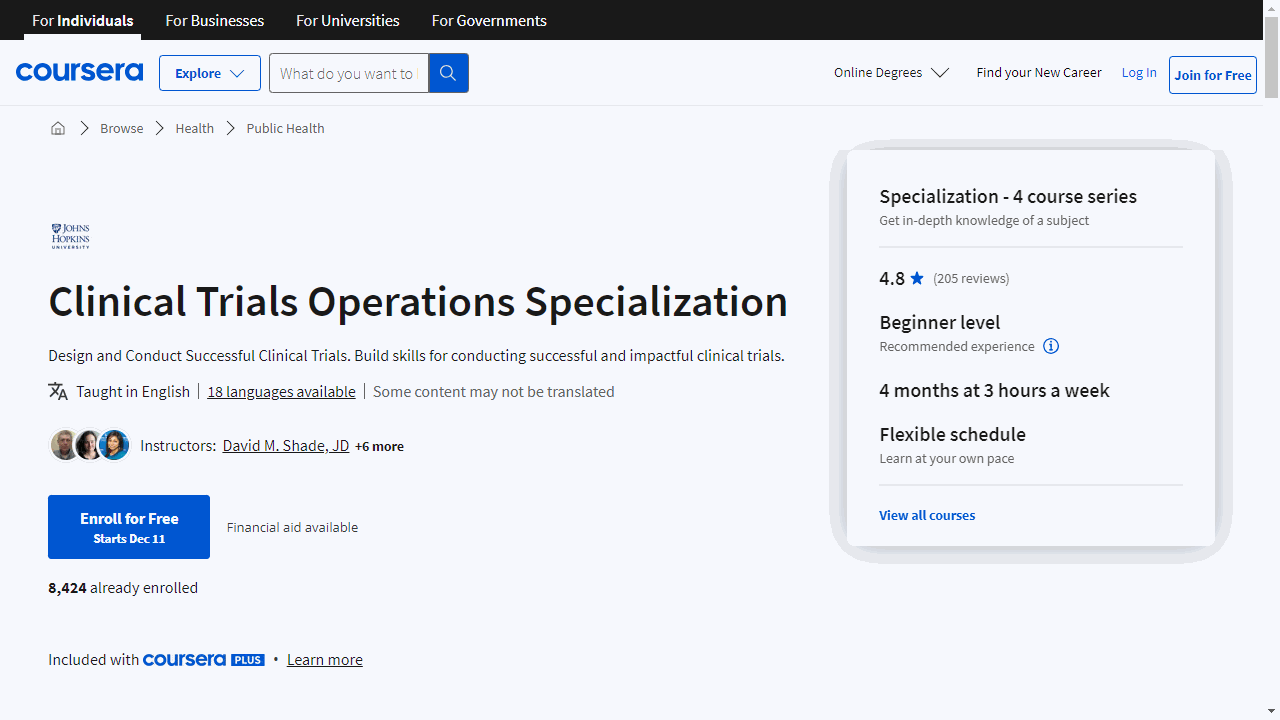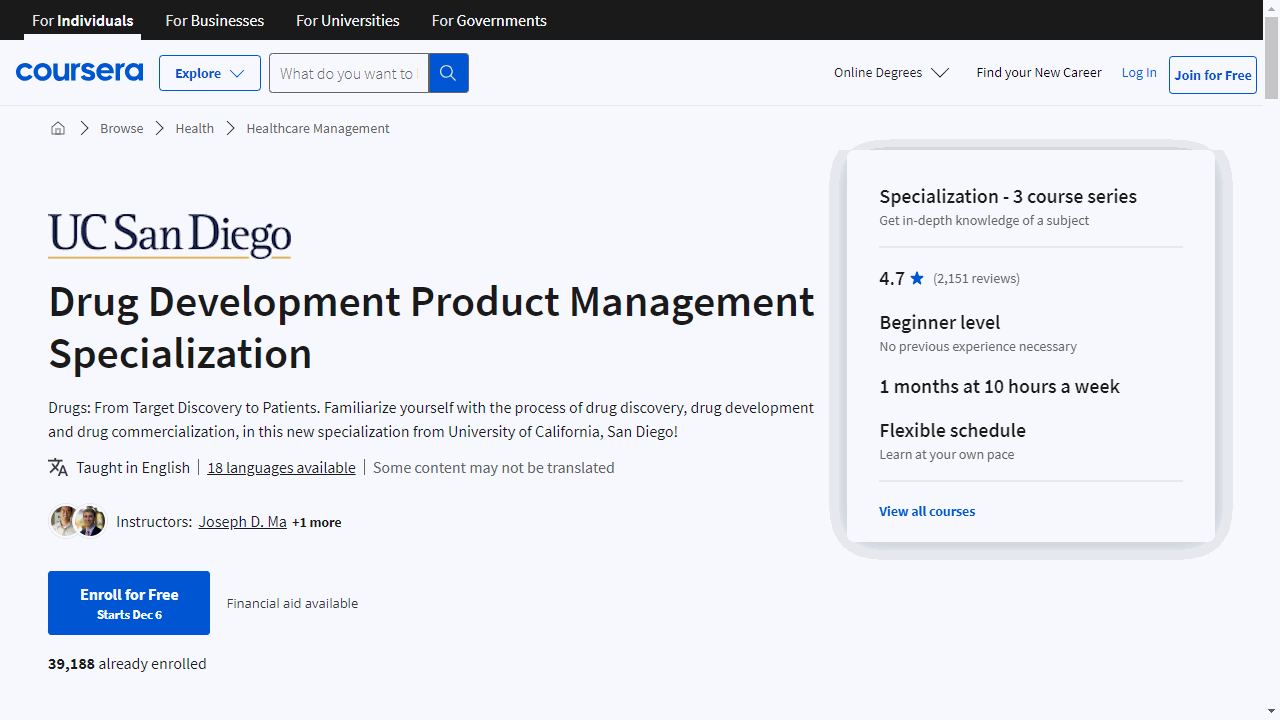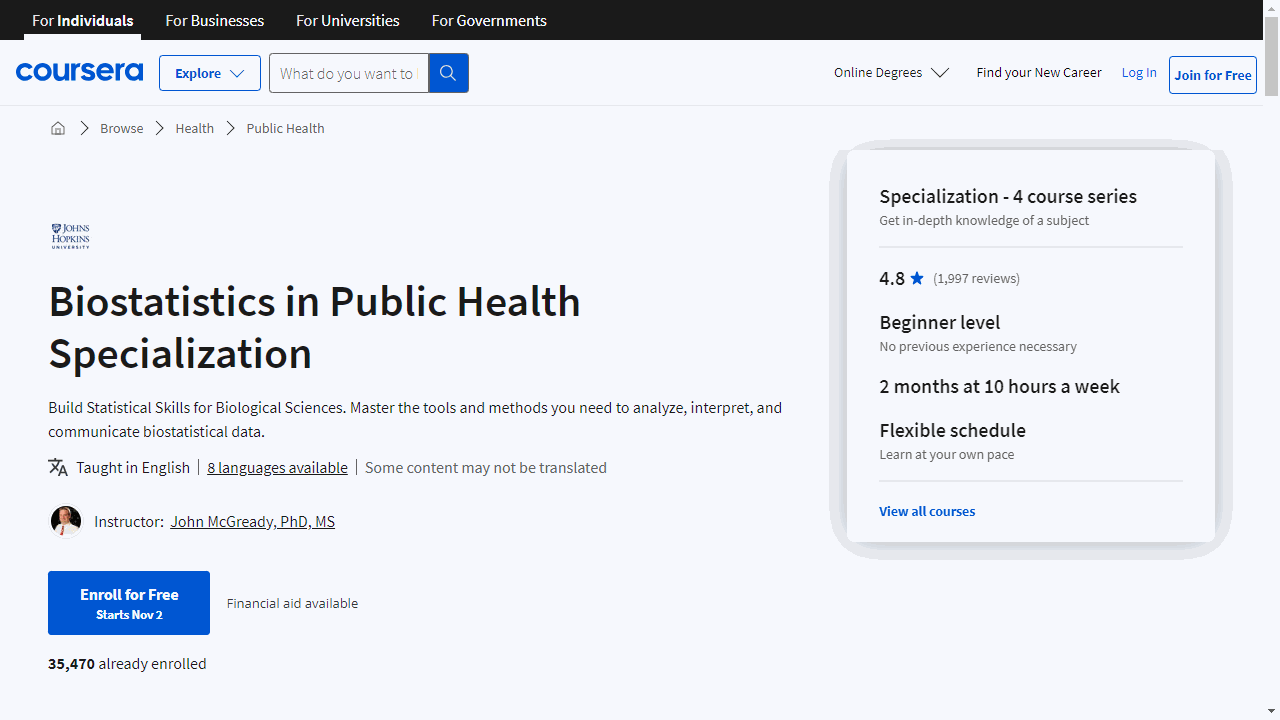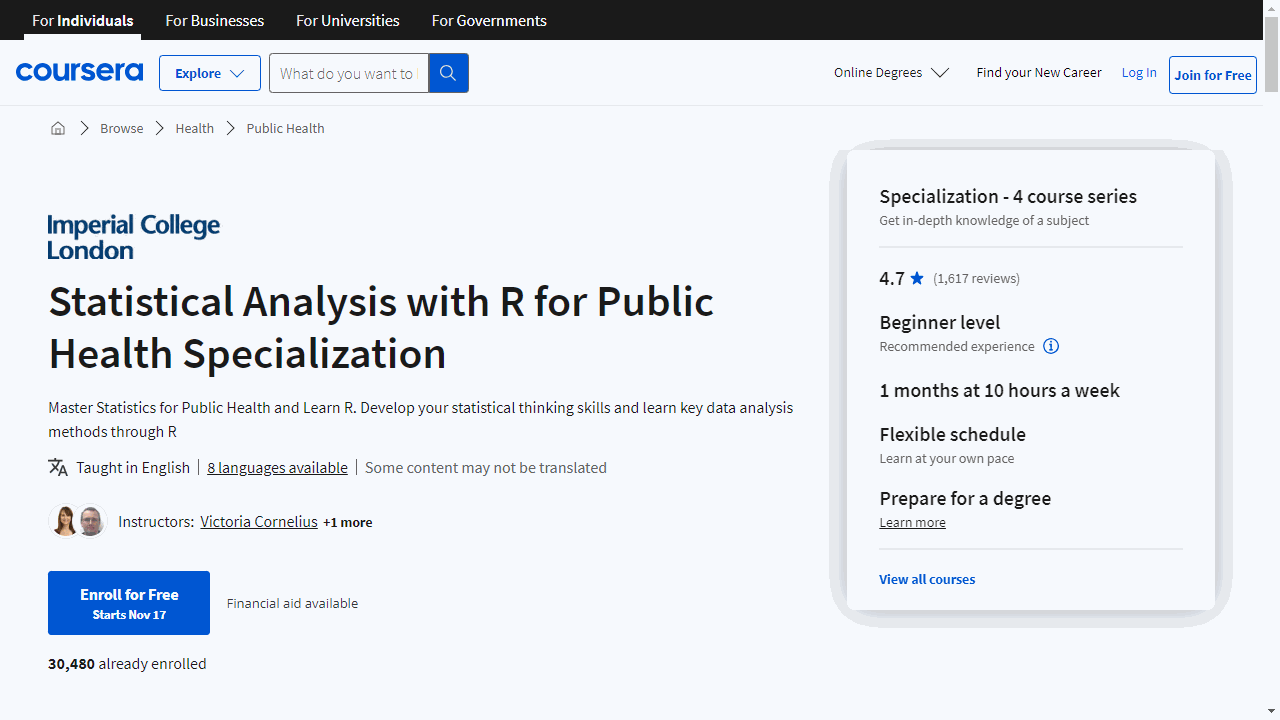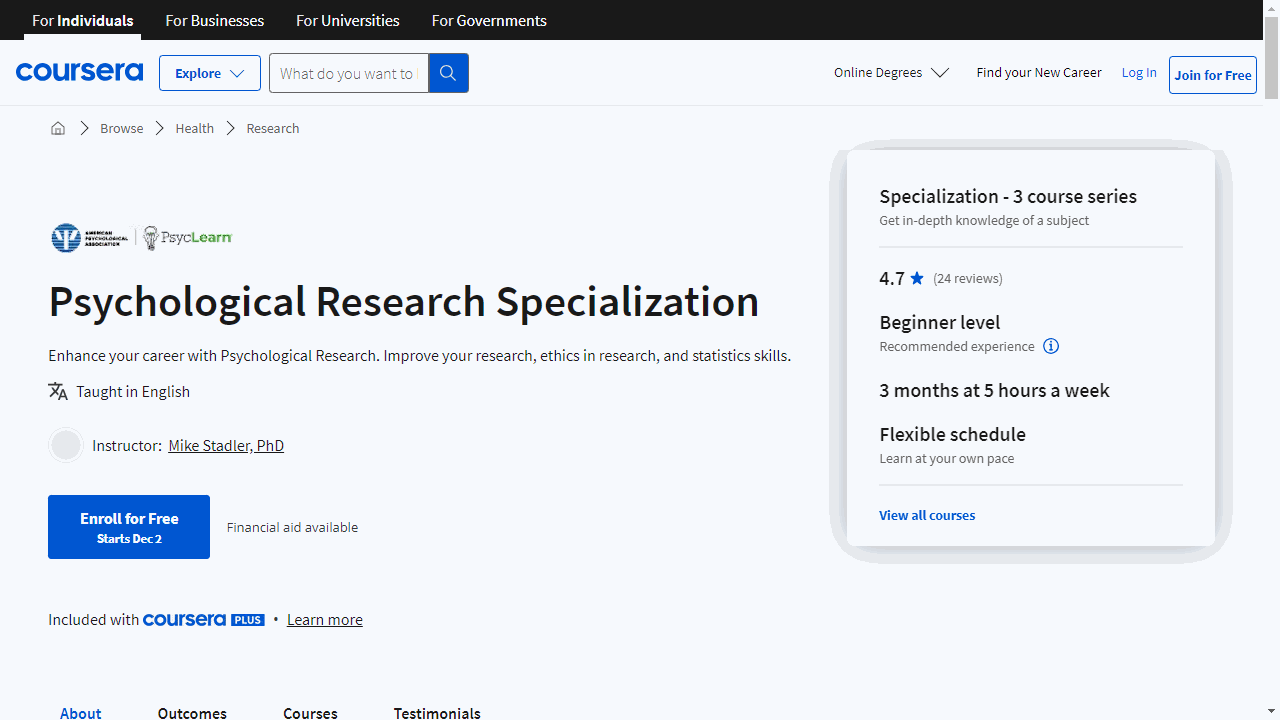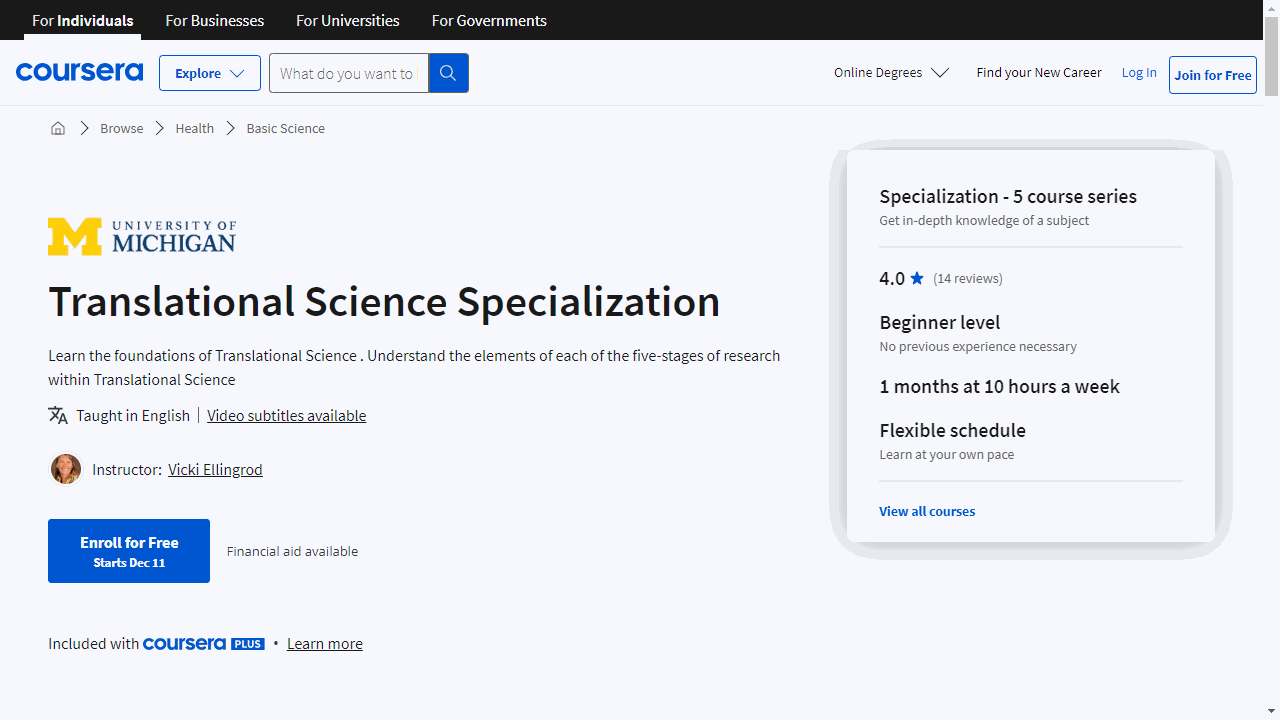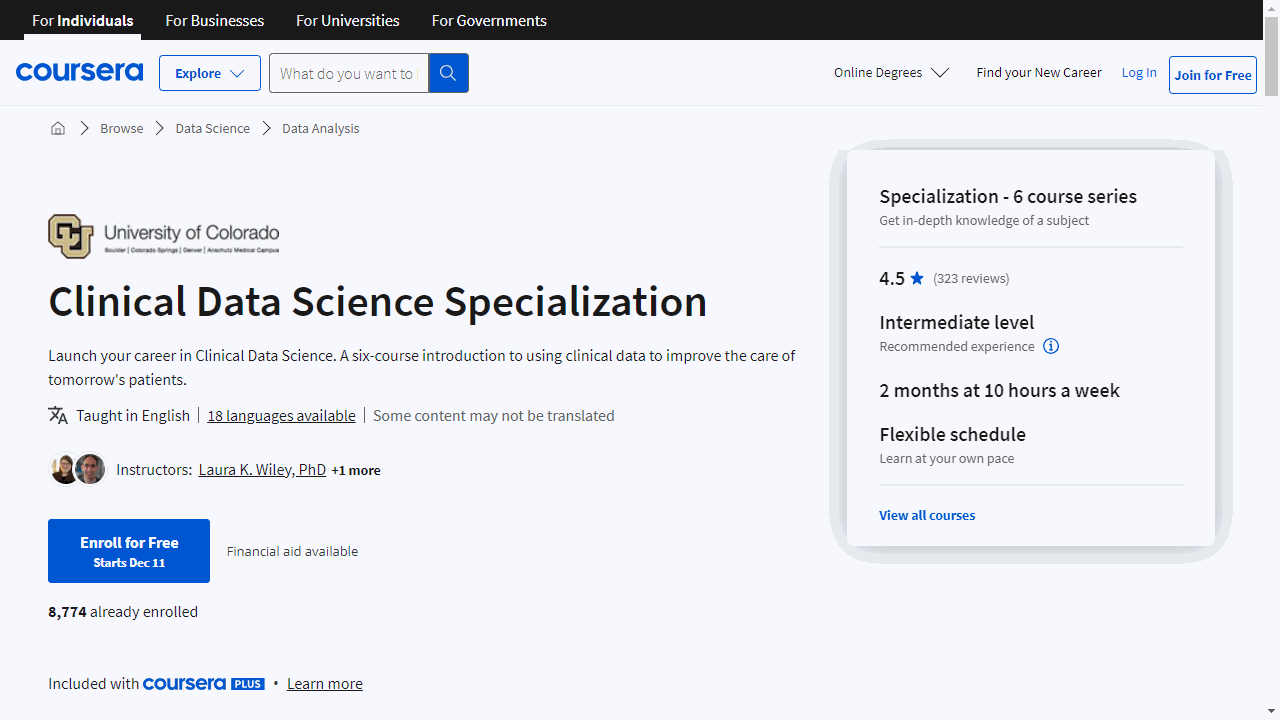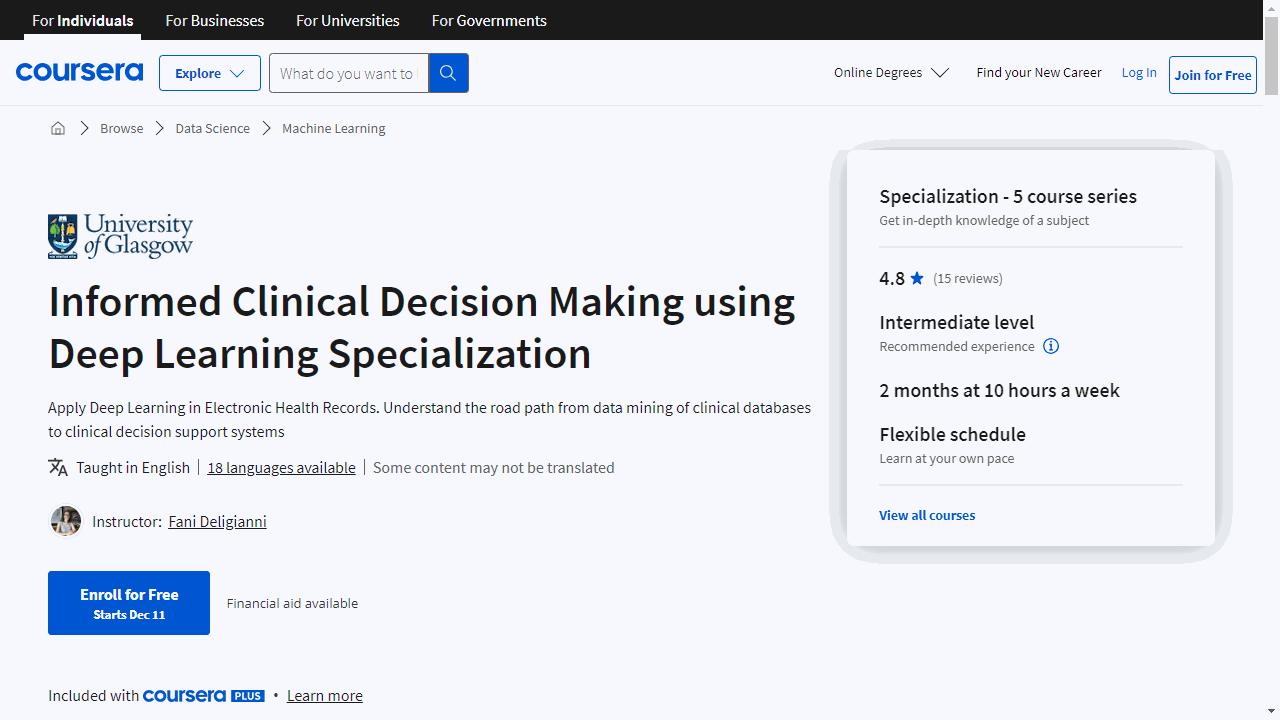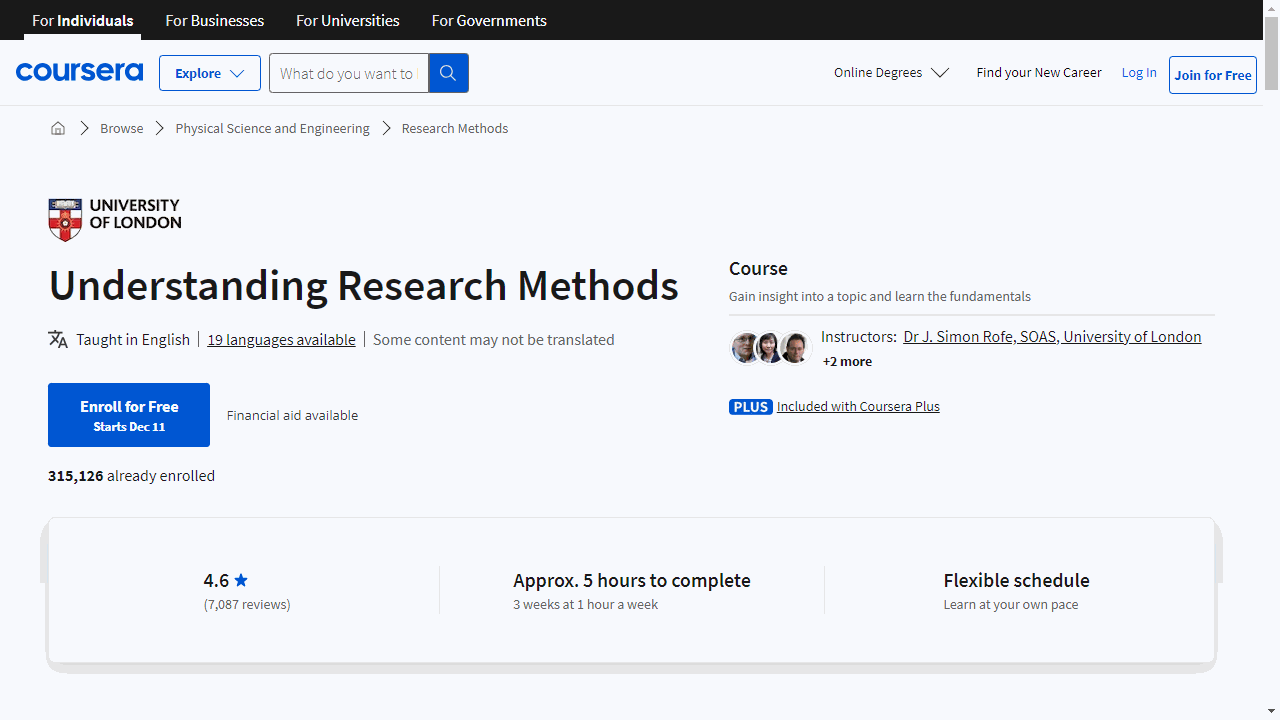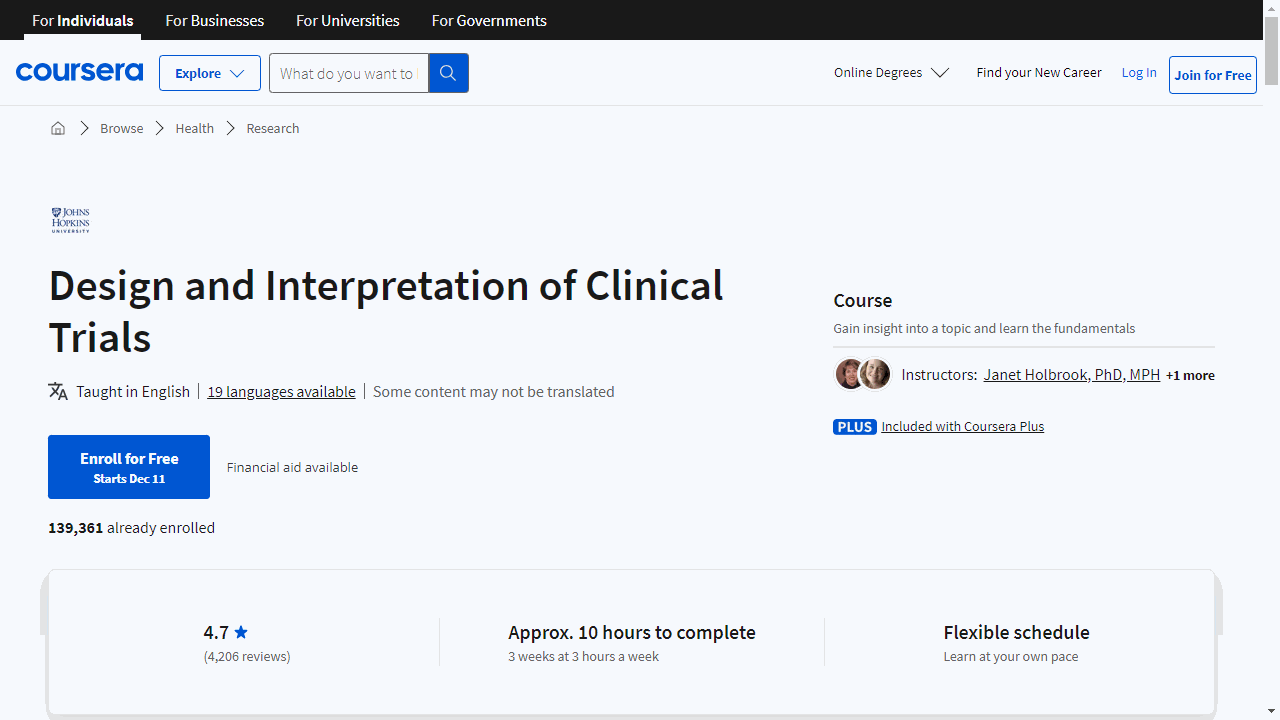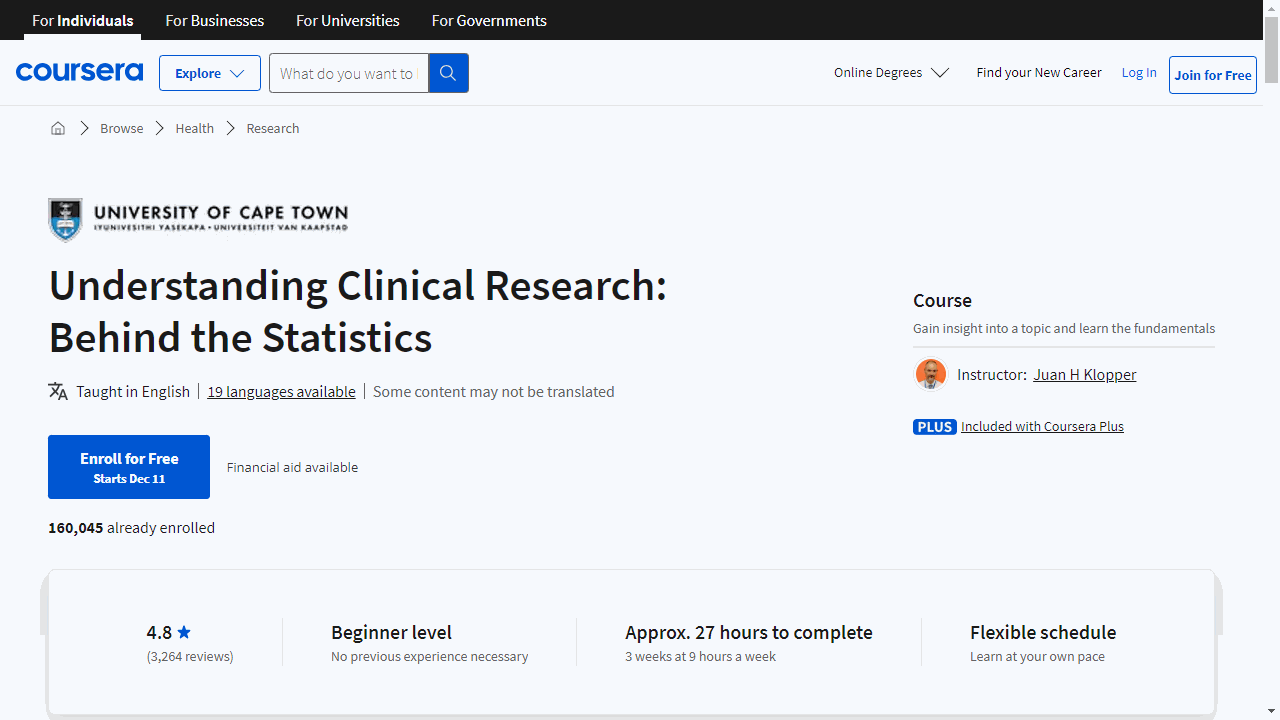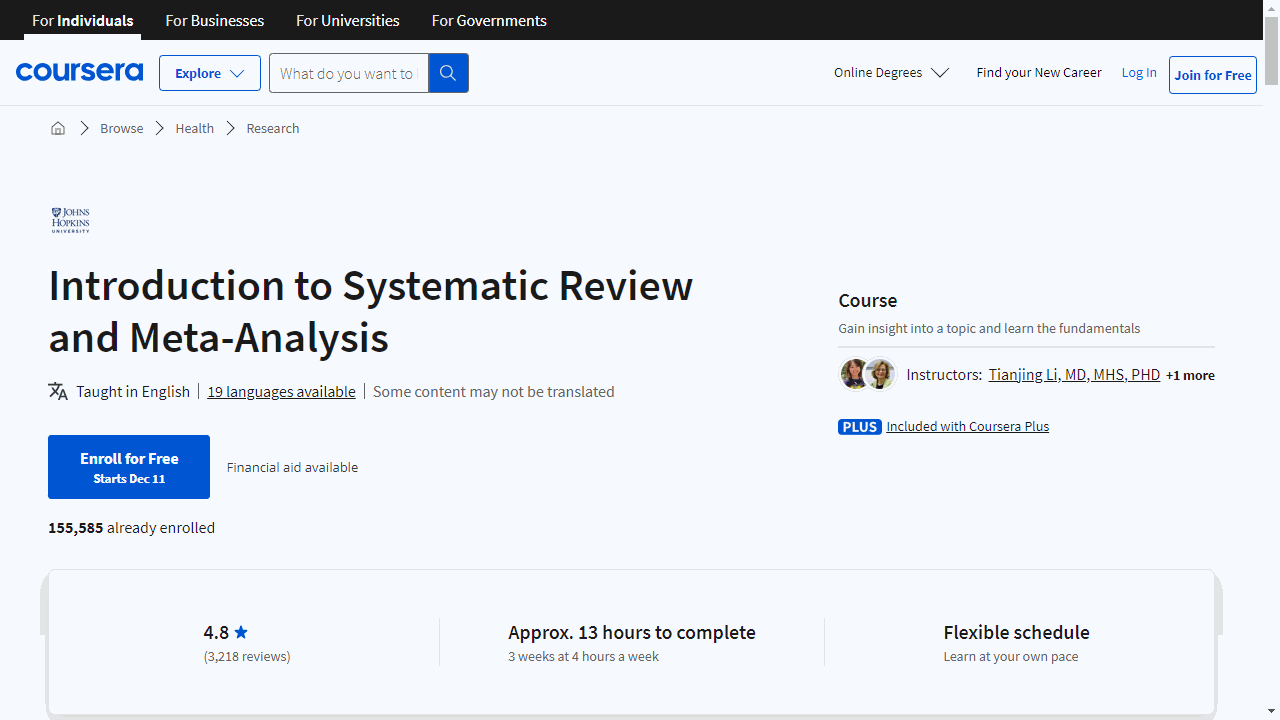Clinical research is a vital field for advancing healthcare, playing a critical role in the development and evaluation of new treatments and therapies.
Understanding the principles and methodologies of clinical research is essential for anyone seeking a career in this field, or even just for anyone wanting to critically evaluate medical information and make informed decisions about their health.
By learning clinical research, you can contribute to the development of new and effective treatments, understand how research findings are generated and interpreted, and ultimately improve patient outcomes.
Finding a good online course on clinical research can be daunting, especially with so many options available.
You want a course that’s both informative and engaging, led by experts in the field, and that provides a practical, real-world understanding of the subject matter.
We’ve reviewed various clinical research courses on Coursera and believe the Drug Development Product Management Specialization offered by the University of California San Diego is the best overall.
This specialization provides a comprehensive overview of the drug development process, covering everything from discovery to commercialization.
It’s taught by leading experts in the field and features practical exercises and real-world case studies.
If this specialization isn’t quite what you’re looking for, we have several other options to explore.
Keep reading to find the best clinical research course for your individual learning goals and interests.
Drug Development Product Management Specialization
This specialization is for you if you’re aiming to enter the pharmaceutical industry or enhance your understanding of how drugs are brought to market.
It’s a series of courses offered by University of California San Diego to give you a thorough understanding of the drug development process, from discovery to commercialization.
In the “Drug Discovery” course, you’ll gain insights into the initial stages of finding a new drug.
You’ll learn about target selection, compound screening, and lead candidate design.
The course also covers the regulatory requirements for filing an Investigational New Drug Application (IND), providing you with a clear picture of the early drug discovery landscape.
Moving on to “Drug Development,” this course takes you through the clinical trial phases.
You’ll understand the objectives and methods of each phase, from safety assessments in Phase 1 to efficacy and side-effect evaluations in Phase 2, and large-scale effectiveness trials in Phase 3.
The course also demystifies the drug approval process, including submissions to regulatory bodies like the FDA and EMA.
The final course, “Drug Commercialization,” bridges the gap between clinical success and market presence.
You’ll explore key concepts such as pharmacoeconomics, marketing strategies, and intellectual property management.
The course also emphasizes the importance of Phase 4 trials for ongoing safety monitoring and market adaptation.
Biostatistics in Public Health Specialization
Provider: Johns Hopkins University
These statistics courses from Coursera will give you the skills you need to analyze and interpret data in public health research.
The specialization covers everything from summary measures to regression analysis.
The first course teaches you statistics basics like calculating summary measures and visualizing data.
You’ll get hands-on practice analyzing real published studies. By the end, you’ll be able to interpret data visualizations and summarize continuous and binary data.
The second course focuses on hypothesis testing and sampling methods.
You’ll learn to evaluate sample variability and calculate confidence intervals. This allows you to make statistical inferences from samples to whole populations. You’ll also master p-values for hypothesis testing.
The third course introduces simple linear regression.
You’ll determine the relationship between an outcome and a single predictor. This is key for modeling how variables impact each other. You’ll also learn to recognize confounding factors that distort statistical analysis.
The fourth course expands on regression analysis with multiple predictors.
You’ll predict an outcome based on several variables, which is crucial for public health research. The course also covers advanced regression techniques like splines and adjustments.
With these comprehensive courses, you’ll gain an in-demand skillset for public health.
The focus on practical data analysis skills prepares you to interpret and conduct statistical research.
Statistical Analysis with R for Public Health Specialization
Provider: Imperial College London
This series of courses is designed to equip you with the statistical tools and R programming prowess needed for public health analysis.
The journey begins with “Introduction to Statistics & Data Analysis in Public Health.”
This course lays the foundation, teaching you to navigate through data sets, identify key features, and conduct basic analyses.
You’ll learn to use R, a free and widely-used software, to dissect health-related data.
The course emphasizes critical thinking and practical application, ensuring you’re not just learning concepts but also applying them to real-world scenarios.
Progressing to “Linear Regression in R for Public Health,” you’ll delve into the relationship between health factors and outcomes.
The course simplifies the process of creating statistical models, starting with correlation and moving to linear regression.
You’ll learn to prepare data, assess model fit, and test assumptions, all within the R environment.
The specialization continues with “Logistic Regression in R for Public Health,” where you’ll tackle more complex analyses.
Public health data can be challenging, but this course teaches you to manage its intricacies.
You’ll learn to run logistic regression analyses, interpret the results, and understand the implications from both individual and population health perspectives.
Lastly, “Survival Analysis in R for Public Health” introduces you to time-to-event data analysis.
You’ll explore techniques like Kaplan-Meier plots and Cox regression, applying them to patient data to identify predictors of health outcomes.
This course reinforces your understanding of regression models and hones your ability to handle real-world data.
Throughout the specialization, you’ll build a robust skill set, including the ability to describe data sets, run various regression analyses, and interpret your findings.
The courses are designed for accessibility, requiring only basic numeracy and no prior knowledge of R.
Clinical Trials Operations Specialization
Provider: Johns Hopkins University
This set of courses equips you with the hands-on skills essential for clinical trial success, ready to contribute to impactful medical research.
Start with “Design and Conduct of Clinical Trials” to learn the nuts and bolts of trial design.
You’ll master randomization, understand how to minimize bias, and grasp the ethical considerations of participant recruitment.
These are the building blocks for producing credible trial results.
Move on to “Clinical Trials Data Management and Quality Assurance” where you’ll tackle the challenge of managing vast amounts of trial data.
Learn to collect, clean, and safeguard data, ensuring its integrity.
You’ll also become adept at implementing quality checks to maintain the highest standards.
In “Clinical Trials Management and Advanced Operations,” you’ll delve into the complexities of trial management.
From handling protocol events to promoting transparency and reproducibility, this course prepares you to maintain the safety and integrity of your research.
Finally, “Clinical Trials Analysis, Monitoring, and Presentation” teaches you to calculate sample sizes, monitor trial progress, and analyze results.
You’ll also learn to effectively communicate your findings, a critical skill for any researcher.
Throughout these courses, key entities like adaptive designs, systematic review, and meta-analysis are not just buzzwords—they’re tools you’ll use to refine your research.
You’ll leave with a deep understanding of the clinical trial process, from the importance of de-identifying data to ensuring compliance with regulations.
Psychological Research Specialization
Provider: American Psychological Association
This specialization is a comprehensive program that equips you with the essentials of psychological research, data analysis, and ethics.
Dive into “Methods for Quantitative Research in Psychology” to master research design and data interpretation.
This course is ideal if you’re keen on understanding the nuts and bolts of psychological studies and how findings are derived.
For a deep dive into the moral side of psychology, “Ethics of Psychological Research” is your go-to.
You’ll explore the significance of ethical practices and tackle the challenges of conducting research with integrity, both with humans and animals.
This course is crucial for ensuring your research upholds the highest ethical standards.
Lastly, “Statistics in Psychological Research” sharpens your statistical skills.
Learn to categorize and visualize data, grasp inferential statistics, and select the right tests for your research.
This course is essential for anyone looking to confidently navigate the statistical landscape of psychology.
Each course is packed with specific skills, from general statistics to research methods, taught by field experts.
Translational Science Specialization
Provider: University of Michigan
Translational science is like a bridge that connects discoveries in the lab to real-world solutions that can help people.
This program guides you through the essentials of it, from initial research to influencing healthcare policy.
Kick off with “Introduction to Translational Science” to grasp how lab observations evolve into health improvements.
You’ll understand the translational research stages and discover career paths in this vital field.
“Translating Basic Research into Research for Humans” zooms in on the T1 phase, where you’ll differentiate between basic and clinical research.
It’s about transforming lab findings into new health solutions, with insights into the government’s regulatory role.
Move on to “Translating Research to Patients” to get the lowdown on clinical trials and their role in validating new treatments.
This T2 phase ensures that lab successes translate to patient benefits.
In “Translating Research to Communities,” you’ll learn to convey research findings effectively to the public.
The course covers population health research, ethical data use, and community collaboration, highlighting the importance of research during health crises like COVID-19 and the Flint water crisis.
Wrap up with “Translating Research to Healthcare Policy,” where you’ll see how research outcomes can shape health policies and practices, leading to substantial healthcare improvements.
Throughout the specialization, you’ll build skills in healthcare, research, and translational science.
You’ll tackle health disparities, engage with Institutional Review Boards, and delve into pressing issues like the Opioid crisis.
Data science’s role in advancing health is also a key focus.
Clinical Data Science Specialization
Provider: University of Colorado System
This specialization equips you with the expertise to navigate and leverage clinical data, a critical skill in healthcare.
Start with “Introduction to Clinical Data Science,” where you’ll grasp how clinical data is generated and managed, while learning SQL and R programming from scratch.
You’ll have the chance to work with actual clinical data and access Google Cloud’s tools at no extra cost.
Move on to “Clinical Data Models and Data Quality Assessments,” which dives into the structure of clinical data.
You’ll become adept at interpreting data models and using SQL to query complex databases like MIMIC3 and OMOP, enhancing your ability to work with diverse data sets.
In “Identifying Patient Populations,” you’ll master computational phenotyping to pinpoint patient groups with specific conditions, such as hypertension.
This course sharpens your ability to combine various data types and develop algorithms, using real clinical data for hands-on experience.
“Clinical Natural Language Processing” introduces you to the intricacies of NLP.
You’ll learn to extract meaningful information from clinical notes by writing regular expressions and handling text data in R, a vital skill for processing unstructured clinical narratives.
With “Predictive Modeling and Transforming Clinical Practice,” you’ll delve into the application of predictive models in healthcare, understanding the challenges of clinical implementation and the impact these models have on patient care.
Lastly, “Advanced Clinical Data Science” prepares you for complex challenges, including temporal and research quality analysis, ensuring you’re ready to tackle advanced topics in the field.
Informed Clinical Decision Making using Deep Learning Specialization
Provider: University of Glasgow
This specialization is a practical journey into clinical data and decision-making with cutting-edge deep learning tools.
It provides a comprehensive skill set for working with EHR data, building and interpreting machine learning algorithms, and ensuring your models are ethical and transparent.
Start with “Data mining of Clinical Databases - CDSS 1,” where you’ll master the MIMIC-III EHR database.
You’ll learn to query, extract, and visualize data, and understand ICD coding.
This course equips you with essential skills in mining clinical databases, managing EHRs, and analyzing descriptive statistics, all with a strong ethical foundation.
In “Deep learning in Electronic Health Records - CDSS 2,” you’ll explore deep learning principles and apply them to EHRs.
You’ll tackle time-series classification for ECG signals, address missing values, and learn imputation techniques.
This course prepares you to handle the complexities of EHR data and develop accurate clinical prediction models.
“Explainable deep learning models for healthcare - CDSS 3” delves into making machine learning understandable.
You’ll work with methods like PFI, LIME, and SHAP, and learn to create model-specific explanations.
By incorporating attention mechanisms in Recurrent Neural Networks, you’ll gain insights into your model’s reasoning.
“Clinical Decision Support Systems - CDSS 4” teaches you to critically evaluate machine learning systems in healthcare.
You’ll study external validation, calibration, bias, fairness, and privacy in CDSS.
The course also covers decision curve analysis and emphasizes the need for human-centered design in CDSS.
Cap off your learning with the “Capstone Assignment - CDSS 5,” applying your knowledge to a real-world challenge.
This final project solidifies your skills and demonstrates your ability to leverage deep learning in clinical decision-making.
Understanding Research Methods
Provider: University of London
This is a practical, step-by-step guide that equips you with the essential skills needed for high-quality research.
Starting with E-tivity 1, you’ll tackle the challenge of criticism in research.
Instructors like Rob Denny and Sandra Halperin will provide insights on how to use feedback constructively.
This skill is crucial, as research is often a collaborative process with plenty of peer review.
As you progress, the course offers a series of “E-tivities,” each featuring readings followed by expert commentary.
You’ll gain diverse perspectives from academics such as Michael Hutt and Gina Heathcote, enhancing your critical thinking and understanding of research methods.
Each E-tivity is interactive, encouraging you to apply what you’ve learned.
This isn’t just about theory; it’s about practicing research methods so you can confidently apply them in real-world situations.
By the end of the course, you’ll have a comprehensive toolkit of research skills.
The University of London’s expert instructors, like Reza Gholami and Charlotte Horlyck, ensure that you’re not just learning, but mastering the art of research.
This course stands out because it’s not just informative—it’s transformative.
You’ll emerge ready to conduct clinical research with a level of professionalism that sets you apart.
Design and Interpretation of Clinical Trials
Provider: Johns Hopkins University
This course takes you through the essentials of clinical trial design, teaching you how to evaluate treatments effectively and ethically.
You’ll start by exploring various trial designs, including parallel and crossover, and understand why the right choice matters.
The course also covers advanced designs like factorial and adaptive, which can optimize trials and answer more complex questions.
Understanding randomization is crucial, and you’ll learn about different schemes that ensure fair treatment assignments.
The course also delves into masking, a technique used to prevent bias by keeping participants unaware of their treatment group.
Outcomes are the heart of clinical trials, and you’ll learn to define and categorize them, influencing trial design.
The course discusses intention to treat and subgroup analysis, essential for interpreting trial data accurately.
Ethics can’t be overlooked in clinical research.
You’ll study the Belmont Report, the Declaration of Helsinki, and HIPAA regulations, ensuring patient safety and privacy.
The course also guides you through the CONSORT guidelines, setting the standard for transparent trial reporting.
As you near the end, you’ll engage in a critical discussion on the relevance of randomized clinical trials in today’s research landscape, considering alternatives like observational studies.
By the end of this course, you’ll have a comprehensive understanding of clinical trial design, ethical considerations, and result reporting.
Ready to scrutinize trials, uphold ethical standards, and contribute to the field confidently.
Understanding Clinical Research: Behind the Statistics
Provider: University of Cape Town
This comprehensive course breaks down complex statistical concepts into understandable chunks, making it ideal if you want to grasp the essentials of clinical research.
You’ll start by exploring various study designs, including observational and experimental, and understand their roles in medical research.
You’ll get familiar with case series, case-control, cross-sectional, and cohort studies, learning how each method contributes to our understanding of health and disease.
Data types are next on the agenda.
You’ll learn to differentiate between nominal, ordinal, and numerical data, as well as discrete and continuous variables.
This knowledge is crucial for categorizing and analyzing research data accurately.
Central to the course is the study of central tendency and dispersion—key tools for summarizing data sets.
You’ll also have the option to apply these concepts using spreadsheet software, giving you practical skills alongside theoretical knowledge.
Sampling and probability are covered in detail, including hands-on activities like dice-rolling to illustrate key principles such as the central limit theorem.
This theorem is a cornerstone of probability theory and essential for making predictions from data.
P-values and data distributions, including the normal distribution, are demystified, helping you understand how to determine the significance of your research findings.
You’ll also learn about hypothesis testing, including how to avoid common errors and use confidence intervals to express the certainty of your results.
The course delves into both parametric tests, like the t-test and ANOVA, and nonparametric tests for data that don’t fit standard assumptions.
You’ll learn to compare categorical data using chi-square tests and understand the relationship between variables with Fisher’s exact test.
A critical component of clinical research is evaluating test performance, which you’ll tackle through sensitivity, specificity, and predictive values.
Finally, you’ll master risk and odds ratios, giving you insights into the likelihood of outcomes based on exposure or treatment.
Throughout the course, real-world case studies will help you apply what you’ve learned, ensuring you can confidently navigate the statistics behind clinical research.
By the end, you’ll not only understand the theory but also be equipped to apply statistical methods to actual research scenarios.
Introduction to Systematic Review and Meta-Analysis
Provider: Johns Hopkins University
This course equips you with essential skills for conducting high-quality research.
You’ll start with an understanding of systematic reviews and meta-analyses, guided by Dr. Hannah Rothstein.
You’ll explore their significance and learn about the people who create and rely on these reviews.
Dr. Betsy Becker will then take you through the process of crafting a precise research question.
You’ll learn to define the scope, refine your question, and apply analytic frameworks, all while examining practical examples.
The course also emphasizes the importance of thorough evidence searching and bias prevention, with Dr. Byron Wallace providing strategies to build robust search strategies and identify potential biases that could affect your study’s integrity.
Dr. Christopher Schmid introduces qualitative synthesis, teaching you how to interpret non-numerical data and integrate it into your systematic review.
When it comes to the quantitative aspect, Dr. Michael Borenstein covers the planning and execution of your meta-analysis.
You’ll delve into fixed and random effects models, understanding the appropriate application of each statistical method.
Throughout the course, you’ll engage in peer review assignments, applying your knowledge and honing your critical evaluation skills.
